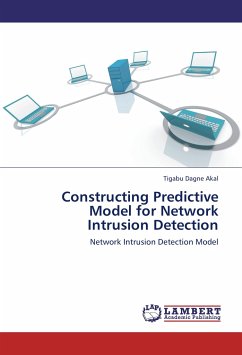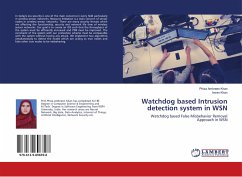
Voice over IP Networks Monitoring & Intrusion Detection
A new approach to challenges & solutions
Versandkostenfrei!
Versandfertig in 6-10 Tagen
45,99 €
inkl. MwSt.

PAYBACK Punkte
23 °P sammeln!
Voice over IP (VoIP) has become a major paradigm forproviding flexible telecommunicationservices and reducing operational costs. Thelarge-scale deployment of VoIP has been leveragedby the high-speed broadband access to the Internetand the standardization of dedicated protocols.However, VoIP faces multiple security issuesincluding vulnerabilities inherited from theIP layer as well as specific ones. Our objective isto design, implement and validate new modelsand architectures for performing proactive defense,monitoring and intrusion detection in VoIPnetworks. Our work combines two domains: netwo...
Voice over IP (VoIP) has become a major paradigm for
providing flexible telecommunication
services and reducing operational costs. The
large-scale deployment of VoIP has been leveraged
by the high-speed broadband access to the Internet
and the standardization of dedicated protocols.
However, VoIP faces multiple security issues
including vulnerabilities inherited from the
IP layer as well as specific ones. Our objective is
to design, implement and validate new models
and architectures for performing proactive defense,
monitoring and intrusion detection in VoIP
networks. Our work combines two domains: network
security and artificial intelligence. We reinforce
existent security mechanisms by working on three
axes: a machine learning approach for VoIP
signaling traffic monitoring, a VoIP specific
honeypot and a security event correlation model for
intrusion detection.
providing flexible telecommunication
services and reducing operational costs. The
large-scale deployment of VoIP has been leveraged
by the high-speed broadband access to the Internet
and the standardization of dedicated protocols.
However, VoIP faces multiple security issues
including vulnerabilities inherited from the
IP layer as well as specific ones. Our objective is
to design, implement and validate new models
and architectures for performing proactive defense,
monitoring and intrusion detection in VoIP
networks. Our work combines two domains: network
security and artificial intelligence. We reinforce
existent security mechanisms by working on three
axes: a machine learning approach for VoIP
signaling traffic monitoring, a VoIP specific
honeypot and a security event correlation model for
intrusion detection.












